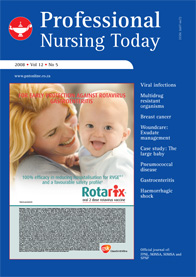Gastroenteritis in young children
Keywords:
paediatrics, gastroenteritis
Abstract
Acute diarrhoea is due to intestinal infection. The patient ingests a pathogen that has contaminated water, food, drink, toys or anything that can be placed in the mouth. An inadequate and unsafe water supply and poor application and practice of hygiene lead to faecal contamination. The most important complication is dehydration, with a poor correlation between the clinical features and actual dehydration. The management of the dehydrated patient depends on a careful assessment of the state of the circulation and the need for resuscitation. In most instances, oral rehydration is appropriate and fully effective if the solution is offered in small quantities at a time. Normally-nourished infants do not require modification of their feeds, beyond adapting the quantity offered as tolerated, but if diarrhoea persists there is a risk of intestinal mucosal damage with malabsorption and nutritional consequences.
Published
2008-10-10
Issue
Section
Paediatrics
By submitting manuscripts to PNT, authors of original articles are assigning copyright to Medpharm Publications (Pty) Ltd. Authors may use their own work after publication without written permission, provided they acknowledge the original source. Individuals and academic institutions may freely copy and distribute articles published in PNT for educational and research purposes without obtaining permission.

